The prescribing of medicines used in mental health care has reached record levels in England, according to new statistics published by the NHS Business Services Authority (NHSBSA).
The annual Medicines Used in Mental Health report, covering the period from April 2015 to March 2025, highlights significant increases in prescribing rates across key categories, including antidepressants, antipsychotics, drugs for dementia, hypnotics and anxiolytics, and treatments for ADHD.
Related Article: Pharmacy owners can now register for new children’s flu jab service
According to the report, a total of 92.6 million antidepressant items were prescribed to an estimated 8.89 million patients in 2024/25, representing a 3.94% increase on the previous year. The number of patients receiving antidepressants also rose by 1.61% compared to 2023/24.
Prescribing of central nervous system (CNS) stimulants and ADHD medicines saw a 24.3% increase among adults and a 9.48% rise among children compared to 2023/24. In total, 3.38 million CNS stimulant and ADHD drug items were prescribed to 325,000 patients.
The report found that medicines for dementia have reached their highest levels since 2015/16, with 4.79 million items prescribed to 326,000 identified patients in 2024/25 – an increase of 6.96% in items and 5.36% in patients since 2023/24.
Related Article: Advice on Guillain-Barré risk for adult RSV vaccine updated by MHRA
Meanwhile, 13.4 million items of hypnotics and anxiolytics were prescribed to 1.85 million patients, with more female than male patients receiving these drugs.
Antipsychotic use also rose, with 13.9 million items prescribed to 873,000 patients, and again, more women than men were represented in most age groups. Twice as many patients receiving these medicines were from the most deprived areas compared to the least deprived.
Related Article: Significant cut in hospital admissions from first year of RSV vaccinations
Other findings from the report include a dramatic decline in the prescribing of barbiturates, with just 163 items prescribed – a 97% drop since 2015/16.
The NHSBSA emphasised that the statistics do not capture the clinical indications for prescriptions, meaning some medicines may be prescribed for reasons other than mental health conditions.


Have your say
Please add your comment in the box below. You can include links, but HTML is not permitted. Please note that comments are not moderated before publication and the views expressed are those of the user and do not reflect the views of The Pharmacist. Remember that submission of comments is governed by our Terms and Conditions. You can also read our full guidelines on article comments here – but please be aware that you are legally liable for any libellous or offensive comments that you make. If you have a complaint about a comment or are concerned that a comment breaches our terms and conditions, please use the ‘Report this comment’ function to alert our web team.